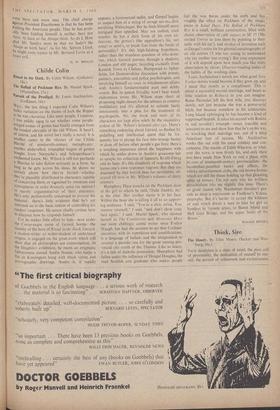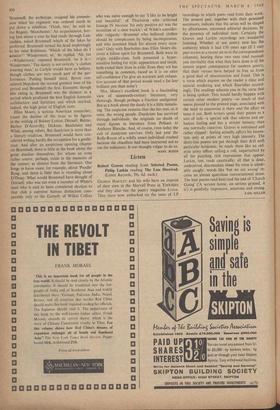Think, Sire
The Dandy. By Ellen NI oers. (Seeker and War- burg, 36s.)
Taw:. dandyism is a state of mind, the pure cult of personality, the dedication of oneself to one- self, the pursuit of refinement and exclusiveness.
grummet!, the archetype, resigned his commis- sion when his regiment was ordered north to put down a rebellion. 'Think, sire,' he said to the Regent. 'Manchester.' An acquaintance, bor- ing him about a tour he had made through Lan- cashire, asked Brummell which of the lakes he preferred. Brummell turned his head imploringly to his valet Robinson. 'Which of the lakes do I admire?"Windermere, sir,' he replied. `Ah, yes --Windermere,' repeated Brummell, 'so it is— Windermere.' The dandy is not entirely 'a clothes wearing man,' as Carlyle would have us believe, though clothes are very much part of the per- formance. Putting himself third, Byron con- sidered Napoleon the second greatest man of his period and Brummell the first. Eccentric though this rating is, Brummell was the dictator in a period which produced the best English domestic architecture and furniture and which marked, indeed, the high point of English taste.
Ellen Moers, a serious American researcher, traces the decline of the beau as he figures in the writing of Bulwer Lytton, Disraeli, Balzac, Barbey D'Aurevilly, Dickens. Baudelaire and Wilde, among others. But dandyism is more than a literary tradition. Brummell would have con- sidered writing hardly the occupation for a gentle- man. And after an auspicious opening chapter on Brummell, there is little in the book about the great dandies themselves, for whom an even richer source, perhaps, exists in the memoirs of the century as distinct from the literature. One longs to know more, for example, about 'Poodle' Byng, and there is little that is revealing about D'Orsay. What would Brummell have thought of Disraeli, who was not even a member of White's (and who is said to have considered election to that club a supreme human distinction com- parable only to the Garter); of Wilkie Collins
who was naïve enough to say 'I like to be bright and beautiful'; of Thackeray who criticised George IV because 'his only positive act was the invention of a shoe buckle'; of Wilde's consider- able vulgarity—Brummel who believed clothes should be conspicuous by being inconspicuous, and who invented black for almost every occa- sion? Only with Beerbohm does Ellen Moers dis- cover a fellow spirit for Brummell. Both were in origin middle-class, both possessed a hyper- sensitive feeling for style, appearances and insult; both ended their lives in exile. Even their wit has something in common, based' as it is on utter self-confidence (`to give an accurate and exhaus- tive account of that period would need a far less- brilliant pen than mine').
Mrs. Moers's excellent book is a fascinating view of nineteenth-century literature, very thorough, though perhaps a fraction undigested. But as a book about the dandy it is a little tantalis- ing. The suspicion remains that she has met, as it were, the wrong people. Dandyism has survived through individuals, the originals no doubt of many figures in literature from Pelham to Anthony Blanche. And, of course, even today the cult of dandyism survives. Only last year the Rolls-Royce of a wildly smart individual crashed because the chauffeur had been instructed not to use the indicators. It was thought vulgar to do so.
MARK BOXER



































 Previous page
Previous page